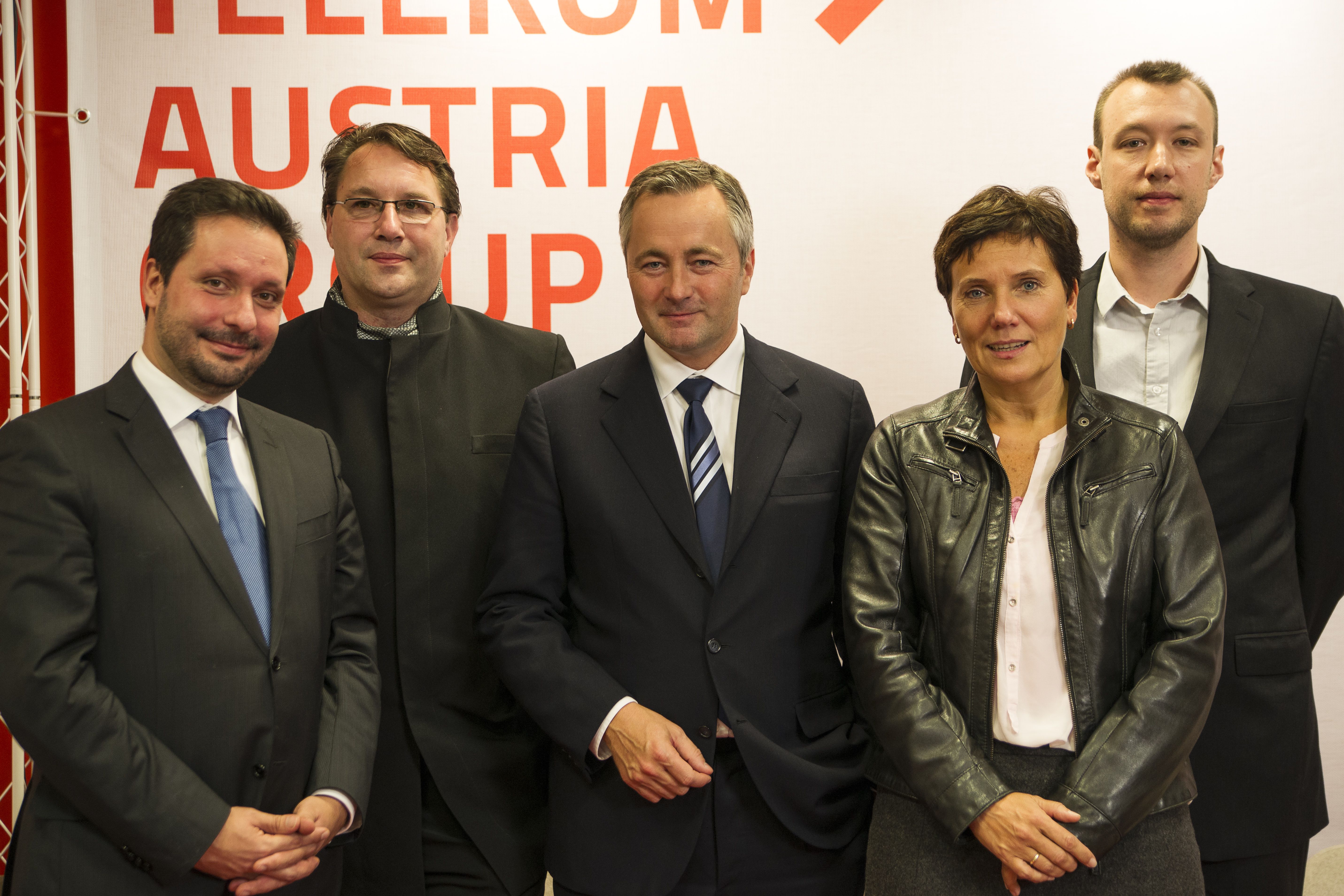Release of 23.10.2013
- The company’s in-house Business School opens its doors with an expert panel discussion
- The main discussion topic was “The Future of Learning” with the participation of international experts
- The kick-off event took place on the occasion of the Business School’s three-year anniversary
- Conclusion: flexibility is promoted also with regard to learning, with mobile devices having an important support function in this context
Vienna, October 23, 2013: Telekom Austria Group Business School was set up three years ago with the main objective of offering all Group’s employees across its eight operating markets in Central and Eastern Europe practice-oriented professional training and further education opportunities in line with the latest scientific findings on learning and knowledge sharing. Great emphasis is also placed on topicality and internationality.
“With the Telekom Austria Group Business School, we are intensively and targetedly investing in our own workforce. The primary goal of the courses is to make participants from the Group’s eight operating markets fit for our corporate strategy, while sharpening their view of the big picture. At the same time, however, it is also important to strengthen our corporate culture, fostering a high willingness to perform coupled with mutual understanding through collaborative learning. Each participant at our Business School is an ambassador, who transports this spirit into his/her own company. I’m not only particularly proud of the roughly 2,500 participants but also of the top trainers we were able to recruit from renowned institutions such as the MIT in Boston or Bocconi in Milan and our internal trainers from the company. They receive positive feedback and can thus develop themselves further,“ said Hannes Ametsreiter, CEO Telekom Austria Group and A1.
“Business School Impact“ Expands Scope of ActivitiesInformation and communications technologies are undergoing a rapid and constant change. In no other industries, flexibility, further training and personal development are in greater demand than at the Telekom Austria Group as an important communications provider. Against this backdrop, the requirements for both employers and employees are constantly evolving. Thus, in 2010 the decision was made to set up an in-house academy which contributes to making employees fir for the future in addition to external vocational training initiatives. A total of 155 curses were held at the Telekom Austria Group Business School over the past 3 years; in statistical terms, this corresponds to one course per working week. In the Business School, participants learn about technology, marketing and finance. A total of 10 in-house and roughly 50 external trainers were employed.
Silvia Buchinger, HR Director at the Telekom Austria Group, is taking this anniversary as the occasion to initiate a new discussion forum. Impact, the name of this new event series, will examine, analyze and question trends from different professional fields. “To date, our Business School has been a purely internal knowledge platform. With this initiative, we are opening the doors of this precious treasure chest to share our know-how and the expertise of our experts with our guests.“
Panel Discussion with HR Experts About “The Future of Learning”The kick-off event entitled “The Future of Learning“ focused on the question of how the right learning methods and the role of education can be indentified in today’s technologically and socially fast-moving times. Decisive factors such as progressive digitalization, social media, shorter attention spans and the declining half-life of knowledge currently determine the daily work routine. Thus, the debate also gave rise to provocative questions as to whether, for instance, learning is still worthwhile or ‘Googling’ as a research method might be simply enough going forward.
Keynote speaker and author Simon Anderson talked about the influence of mobile end-devices and online applications on the further development of learning and its framework conditions. He also stressed the necessity to recognize what kind of knowledge is no longer relevant to simply forget about it.
In the follow-up discussion, Silvia Buchinger presented Telekom Austria Group’s main objectives: “In concrete terms, the main question is on how employees can exchange their experiences at best within a large organization. We want to motivate our employees to actively share their knowledge while nurturing their self-responsible learning based on a corporate culture and on proper digital tools that allow flexible learning.“
Two additional international experts took part in the discussion. Volker Kunze, learning consultant from Germany pointed out that in companies, time for learning should be provided in order to integrate life-long-learning into the daily routine. Moreover it is crucial to optimise old learning content for new devices since they will be part of the standard classroom equipment in the near future.
Luis Vives, professor at the renowned University Esade in Spain held a more traditional view concerning learning: information gathering via Google cannot substitute classic knowledge gaining in education. The difference has to happen on the level of how content is tailored so that education becomes interesting and fun. In his opinion, media literacy should be fostered from early childhood onwards: Instead of prohibiting the usage of tablets and smartphones, children should be shown the right way of using these devices.
70 guests from the HR and Learning industry took part in the event and sparked a lively discussion on the topic of the future of learning.
